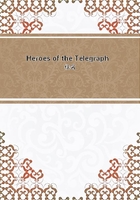
第61章
But on their arriving at New Orleans the vessel had sailed. In this predicament Edison fell in with a travelled Spaniard, who depicted the inferiority of other countries, and especially of South America, in such vivid colours, that he changed his intention and returned home to Michigan. After a pleasant holiday with his friends he resumed his occupation in the Louisville office.
Contact with home seems to have charged him with fresh courage. He wrote a work on electricity, which for lack of means was never published, and improved his penmanship until he could write a fair round backhand at the rate of forty-five words a minute--that is to say, the utmost that an operator can send by the Morse code. The style was chosen for its clearness, each letter being distinctly formed, with little or no shading.
His comrades were no better than before. On returning from his work in the small hours, Edison would sometimes find two or three of them asleep in his bed with their boots on, and have to shift them to the floor in order that he might 'turn in.'
A new office was opened, but strict orders were issued that nobody was to interfere with the instruments and their connections. He could not resist the infringement of this rule, however, and continued his experiments.
In drawing some vitriol one night, he upset the carboy, and the acid eating its way through the floor, played havoc with the furniture of a luxurious bank in the flat below. He was discharged for this, but soon obtained another engagement as a press operator in Cincinnati. He spent his leisure in the Mechanics' Library, studying works on electricity and general science. He also developed his ideas on the duplex system; and if they were not carried out, they at least directed him to the quadruplex system with which his name was afterwards associated.
These attempts to improve his time seem to have made him unpopular, for after a short term in Cincinnati, he returned to Port Huron. A friend, Mr. F. Adams, operator in the Boston office of the Western Union Telegraph Company, recommended Edison to his manager, Mr. G. F.
Milliken, as a good man to work the New York wire, and the berth was offered to Edison by telegraph. He accepted, and left at once for Boston by the Grand Trunk Railway, but the train was snowed up for two days near the bluffs of the St. Lawrence. The consequence might have been serious had provisions not been found by a party of foragers.
Mr. Milliken was the first of Edison's masters, and perhaps his fellows, who appreciated him. Mediocrity had only seen the gawky stripling, with his moonstruck air, and pestilent habit of trying some new crotchet.
Himself an inventor, Milliken recognised in his deep-set eye and musing brow the fire of a suppressed genius. He was then just twenty-one. The friendship of Mr. Milliken, and the opportunity for experiment, rendered the Boston office a congenial one.
His by-hours were spent in a little workshop he had opened. Among his inventions at this period were a dial telegraph, and a 'printer' for use on private lines, and an electro-chemical vote recorder, which the Legislature of Massachusetts declined to adopt. With the assistance of Mr. F. L. Pope, patent adviser to the Western Union Telegraph Company, his duplex system was tried, with encouraging results.
The ready ingenuity of Edison is shown by his device for killing the cockroaches which overran the Boston office. He arranged some strips of tinfoil on the wall, and connected these to the poles of a battery in such a way that when the insects ran towards the bait which he had provided, they stepped from one foil to the other, and completed the circuit of the current, thus receiving a smart shock, which dislodged them into a pail of water, standing below.
In 1870, after two years in Boston, where he had spent all his earnings, chiefly on his books and workshop, he found himself in New York, tramping the streets on the outlook for a job, and all but destitute.
After repeated failures he chanced to enter the office of the Laws Gold Reporting Telegraph Company while the instrument which Mr. Laws had invented to report the fluctuations of the money market had broken down.
No one could set it right; there was a fever in the market, and Mr.
Laws, we are told, was in despair. Edison volunteered to set it right, and though his appearance was unpromising, he was allowed to try.
The insight of the born mechanic, the sleight of hand which marks the true experimenter, have in them something magical to the ignorant. In Edison's hands the instrument seemed to rectify itself. This was his golden opportunity. He was engaged by the company, and henceforth his career as an inventor was secure. The Gold Indicator Company afterwards gave him a responsible position. He improved their indicator, and invented the Gold and Stock Quotation Printer, an apparatus for a similar purpose. He entered into partnership with Mr. Pope and Mr.
Ashley, and introduced the Pope and Edison Printer. A private line which he established was taken over by the Gold and Stock Telegraph Company, and soon their system was worked almost exclusively with Edison's invention.
He was retained in their service, and that of the Western Union Telegraph Company, as a salaried inventor, they having the option of buying all his telegraphic inventions at a price to be agreed upon.